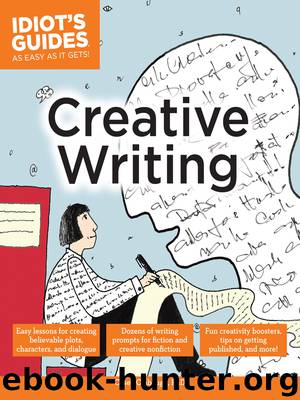Creative Writing by Casey Clabough PhD

Author:Casey Clabough, PhD
Language: eng
Format: epub
Publisher: DK Publishing
Published: 2014-05-31T16:00:00+00:00
Tracing Density and Intensity
Wallace Stevens once intimated that poems help us live our lives. (I wonder if he felt that way after breaking his own hand hitting Ernest Hemingway on the jaw, only to have the younger writer give him a thorough pounding and leave him lying on his back in a puddle?) I don’t happen to think people’s lives are determined by art. I think there are much more powerful determining forces (and I don’t mean Hemingway’s jaw).
For me, it would be extremely hard to go through life as if for the first time, as though nobody had been there before me. Poetry reconciles us to ourselves, as Stevens says, in that it can’t be peculiar to you if someone else has had it before. It’s kind of a prophecy of what’s to come, so if you’re reading something about being 50 or being 70 when you’re 30, it doesn’t come as quite such a shock when you get to that later age. I don’t want to imagine a life without any sense of being companied by other voices that have been along the same road.
It’s been maintained that most literary people have an episode in their lives, often in late adolescence, when they write. In my case, I believe this time helped me understand what a different activity creative writing is from criticism, engaging wholly different spheres of the soul, mind, and personal essence.
Sometimes when I write about particularly complex poems, I write them out longhand rather than typing them on my computer. This act makes me feel what it’s like to have viscerally formed that poem—what it was like to put down a line and make it connect with the next one. That seems to me to be the single most helpful way to feel them through. You’ll also find that because you wrote them, so to speak, you know them by heart. Something goes through the muscles that comes back to the brain, and you know those words in a different way than if you’d just read them.
After you’ve written out poems (yours or others’), they tend to come up in your mind frequently when you don’t have the book around, as a line might rise in the mind of a poet, unbidden and against your will. That experience helps feed into a sense of how the poem gathers itself together. After all, it’s only a device like any other.
Does meeting the poets you write about change anything at all–your feeling about their work, for example? I believe it’s better not to meet them, but often it’s quite helpful to hear them read. I like having heard the voice attach itself to the poems, although it’s not indispensable. It’s true that some poets are more performative than others—think of the incantatory style W. B. Yeats used in which poets want to chant their poetry.
The opposite approach is the deadpan or restrained reading. Stevens is one of these musing readers rather than a performing reader. Yet the very flatness of it can be revealing when the voice suddenly reads a line in a way that is not flat.
Download
This site does not store any files on its server. We only index and link to content provided by other sites. Please contact the content providers to delete copyright contents if any and email us, we'll remove relevant links or contents immediately.
Big Magic: Creative Living Beyond Fear by Elizabeth Gilbert(5754)
Paper Towns by Green John(5177)
On Writing A Memoir of the Craft by Stephen King(4931)
The Doodle Revolution by Sunni Brown(4752)
Hyperfocus by Chris Bailey(4110)
Evolve Your Brain by Joe Dispenza(3671)
Unlabel: Selling You Without Selling Out by Marc Ecko(3658)
The Red Files by Lee Winter(3411)
Draw Your Day by Samantha Dion Baker(3352)
The Power of Mindful Learning by Ellen J. Langer(3220)
The Art of Dramatic Writing: Its Basis in the Creative Interpretation of Human Motives by Egri Lajos(3058)
The War Of Art by Steven Pressfield(2952)
Applied Empathy by Michael Ventura(2890)
The 46 Rules of Genius: An Innovator's Guide to Creativity (Voices That Matter) by Marty Neumeier(2840)
How to be More Interesting by Edward De Bono(2789)
Keep Going by Austin Kleon(2755)
Why I Am Not a Feminist by Jessa Crispin(2747)
How to Stop Worrying and Start Living by Dale Carnegie(2709)
You Are Not So Smart by David McRaney(2644)
